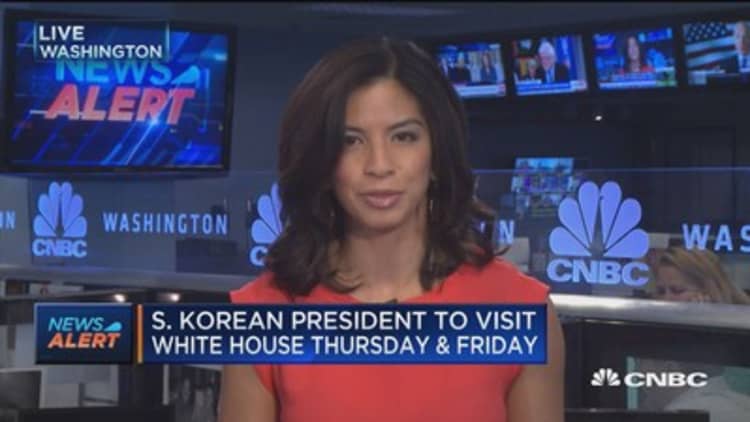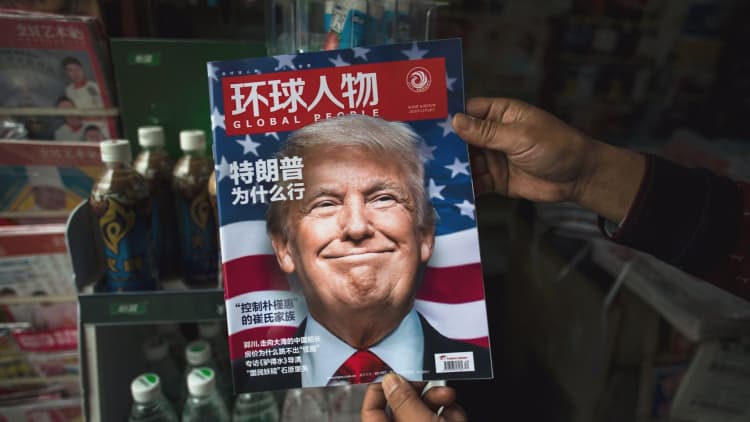President Donald Trump's mixed messages to Seoul leave little doubt that there's likely to be some intense discussions behind the scenes this week during South Korean President Moon Jae-in's two-day summit in Washington.
"Both of them are going to work very hard to put a positive public face on it," said Doug Bandow, a senior fellow at the Cato Institute, a libertarian Washington think tank. "But the South Koreans are quite nervous."
Moon, who took office in May, begins the summit Thursday and is likely to hear Trump's demands on renegotiating a U.S.-South Korea free-trade deal and the administration's latest approach to the nuclear and ballistic missile threat from North Korea, including ongoing efforts to get China to pressure Pyongyang. And Moon's push back on the U.S.-supplied THAAD tactical missile defense system is likely to be another hot-button issue for discussion.
At the same time, during the presidential campaign Trump indicated Seoul should spend more money on its own defense, suggesting that if they didn't he would be prepared to pull out the roughly 28,000 U.S. forces stationed in South Korea.
"The South Koreans need the United States a lot to help defend against the north," said Thomas Henriksen, a senior fellow at the Hoover Institution, a public policy think tank at California's Stanford University. "So that tempers any sort of extreme views that the South may have toward President Trump."
Moon, a former human rights lawyer, has been seen as more liberal in his approach to North Korea than his predecessor and open to engagement with the hermit regime. The new South Korean president could turn back the clock to the days when the so-called Sunshine Policy by Seoul allowed funds to go to Pyongyang from a Kaesong joint factory complex located in North Korea.
Ironically, if Moon gets his way and reopens the Kaesong factory, it could turn back the clock to the early 2000s when Seoul had policies seen as softer to the North and had to contend with a more hardline stance from another Republican in the White House.
"We could sort of see a replay like we had when George W. Bush was president and there was more of a hardline [policy] on North Korea," said Dean Cheng, a senior research fellow at the Heritage Foundation, a Washington-based conservative think tank. "That was one of our less coordinated periods of U.S.-South Korea relations."
Kaesong, a duty-free zone, opened in 2004 and at one time employed more than 50,000 North Koreans but was closed by Moon's conservative predecessor in 2016. More than 120 South Korean companies had participated in Kaesong and it represented around $2 billion in trade with North Korea.
Reopening Kaesong could put Moon at odds with the Trump administration, which has been tightening economic sanctions against Pyongyang and pushing for more action by the United Nations' Security Council.
Then again, some experts suggest the Trump administration may let Moon's more pro-engagement policy with the North to play out because Seoul may ultimately get its fingers burned in the process and then draw back to a more conservative approach in step with Washington.
"The South Korean president might get mugged by reality," said Henriksen. "The North Korean regime is very hard to deal with."
Added Henriksen, "Even though things are going along fairly smooth, then they'll [North Korea] just change their mind. They've broken so many agreements that this makes everyone a little bit wary of entering into a treaty or into some sort of deal with them."

Trump wants to talk trade
However, one deal that Trump might wish to discuss this week with Moon is the free trade agreement between the U.S. and South Korea.
In April, Trump referred to the current free trade deal with South Korea as "unacceptable," vowing it would be renegotiated or scrapped, according to a Reuters interview.
The five-year-old deal, also known as KORUS, was negotiated by the Obama administration and Trump claimed it was "a horrible deal made by Hillary [Clinton]," a former Secretary of State and his rival in the presidential election.
A report last year by the Economic Policy Institute, a nonpartisan think tank, found that trade deficits with South Korea cost in excess of 95,000 American jobs from 2011 to 2015. It indicated that most of the loss in jobs was in the manufacturing sector.
"I suspect there will be an effort at renegotiation," said Cato's Bandow, a former special assistant to President Ronald Reagan. "The South Koreans are fairly protectionist."
Much of South Korea's trade is controlled by conglomerates, or chaebol, which are usually owned by a family and account about 90 percent of the gross national product.
South Korea is the sixth-largest goods trading partner of the U.S. with $112 billion in goods traded in 2016, although there was a trade deficit with South Korea of almost $28 billion last year and when including services another $10.7 billion.
"Trump seems to be much more hostile to a free-trade deal than a number of his appointees," said Bandow. "But even the president has talked about support for bilateral agreements."
Regardless, Bandow said he wouldn't be surprised if Defense Secretary James Mattis and Secretary of State Rex Tillerson "kind of sit down with him (Trump) and emphasize this is a treaty ally. We have a lot at stake there. The economic relationship is part of that."
South Korea ranks as the world's fifth-largest economy and its largest trading partner is China followed by the U.S.
China's pushback over THAAD anti-missile system
Meantime, China has been putting economic and diplomatic pressure on South Korea over the controversial THAAD system, which stands for Terminal High Altitude Area Defense.
"China isn't stopping North Korea but it is trying to stop South Korea from defending itself," said Heritage's Cheng. "China appears to expect South Korea to do what China wants regardless of whether it can protect itself."
THAAD was deployed in South Korea after several years of discussion with Seoul, but when Moon got into office he suspended it and announced an environmental impact assessment, which will effectively result in a delay in the full implementation of four additional launchers that are already there in South Korea. Trump also suggested in April that South Korea should pay $1 billion for the THAAD system but the administration later downplayed such talk although it already added to strains in the alliance.
"There's the possibility that there could be additional discussions about how long this [THAAD] review is going to take," said Scott Snyder, a Washington-based senior fellow for Korea studies and director of the program on U.S.-Korea policy at the Council on Foreign Relations.
Added Snyder, "The U.S. is probably going to want to hear President Moon is committed to implementing the missile defense system regardless of any pressure that China tries to put on South Korea in order to have that decision reversed."
China is opposed to THAAD because it believes the advanced anti-missile system's powerful radar gives the U.S. and South Korea capability not only to spot ballistic missiles from North Korea, but to potentially look deep into China to monitor military activities. The THAAD site is located in a town about 420 miles from China.
"The Chinese government has boycotted a lot of the South Korean firms," said Hoover's Henriksen. "It's put pressure on not allowing tourists to go to South Korea."
The boycott called for by China's state media hasn't just hurt tourism but it's resulted in food shipments to China falling in recent months. It also impacted South Korean-owned retail companies operating in China, including some forced to close.
Even so, experts suggest the boycott has been costly for China in some respects too.
Bandow said the trade retaliation has led to China being seen now as a "pariah state in South Korean public opinion. The South Koreans now have a lower opinion of China than Japan — and that takes quite a bit of work."
WATCH: Why Trump's foreign policy is on a collision course in the South China Sea



